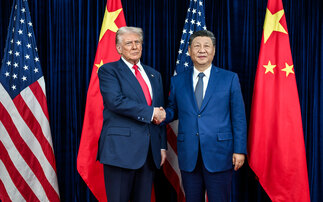Can you provide an overview of your investment approach?
My approach has not really changed in the 22 years that I have been managing money at Fidelity. It's all about bottom-up stock picking. Before investing in any company, you have to understand its business model - how they make money in the long-term, management quality and track record, before assessing the extent to which the valuation reflects these factors.
What has changed during Covid-19 is that as we are no longer seeing companies physically, so we have to work even harder to find out this information. Since January, we have had all our company meetings on Zoom and we have had to try and gauge the body language of management on these calls. We have analysts present on-the-ground in Singapore, Mumbai, Shanghai and Hong Kong, which helps us understand the mood and sentiment of these markets and the business models of the companies that operate there.
One key development that I am seeing more of is the increasing emphasis on sustainability factors from both investors and companies. This is clearly a trend that is here to stay.
Asian markets have generally bounced back quite strongly since the first quarter for the year. Is this a true reflection of the fundamental outlook?
Back in March there was a lot of uncertainty as we had never faced this kind of situation before. The co-ordinated policy response from global policymakers has helped put a floor under equity markets, but in the subsequent recovery there has been a very sharp distinction between the winners and losers. Winners have generally been beneficiaries of the stay at home economy - companies in food delivery, online gaming, entertainment and online education.
Even previously hard-hit areas are also showing signs of recovery, with domestic air travel in China now about 70% of pre-Covid-19 levels. And in the recent Golden Week holiday period, our team in China saw packed restaurants and malls indicating a strong recovery in domestic consumption. China has managed to contain the outbreak, so there is confidence in its recovery.
There seems to be a clear line between North and South Asia in terms of their resumption of economic activity. How is this impacting your views?
Countries such as China, Taiwan and Korea have contained Covid-19 well and this shows in terms of the recovery of the stock markets. Taiwan and Korea are both relatively tech-heavy markets so have also benefitted from more people working from home and related demand for goods and services such as cloud storage.
On the negative side, India has seen a sharp rise in cases, while Indonesia and Philippines have faced further lockdowns. Vietnam and Thailand have both done relatively well in terms of containing the virus, but both economies rely on tourism which has been hard-hit.
There are still opportunities to be had. For instance, in India, during the peak of the crisis in March, I participated in the IPO of SBI credit cards, a company with a long runway of growth. This is why I believe that in any crisis you will also find opportunities to invest in companies that you believe in.
The online space has generally led markets, is this just a China story?
I have always been bullish on the e-commerce sector and companies such as Alibaba and Tencent. I believe this structural shift towards increased digitisation and online will continue even after this crisis.
This trend is most evident in China, but it is clearly a phenomenon we see elsewhere in the region. However, the big Chinese internet players recognise this and have an ever-expanding ecosystem with, for example, Alibaba owned Lazada offering strong exposure to the shift online in ASEAN. That being said, there are some local operators across the region, like Naver in Korea, who could be beneficiaries of this trend.
Going forward, you are going to see the emergence of more fintech companies such as Ant Financial or social media companies such as ByteDance, which the parent of TikTok and a company I invested in 18 months ago. ByteDance is increasingly taking market share in the digital advertising space in China and I believe it will emerge as long-term winner. Its management has also done a remarkable job of growing the business and the brand globally.
You have experienced quite a few market shocks throughout your career, starting with the Asian financial crisis through to what we see today. What are the key lessons that you have taken away from the current Covid-19 shock?
My key lessons from Covid-19 and other crises I have experienced are that you must focus on individual companies and spend time getting to know the company you are investing in. Invest in long-term winners as they will recover faster and gain more market share during any crisis. Look at valuation and understand what the current valuation discounts - if a stock slumps c50%, investors should realise that it is often panic selling and it may provide an opportunity to invest. Finally, maintaining a long-term investment horizon, rather than short-term trading and chasing markets, should ultimately pay off and reward investors over time.
Learn about Fidelity's Asia expertise and investment strategies
Important information
This information is for investment professionals only and should not be relied upon by private investors. Past performance is not a reliable indicator of future returns. Investors should note that the views expressed may no longer be current and may have already been acted upon. The Fidelity Asia Fund has the potential of having high volatility either from its composition or the techniques used to manage it. It uses financial derivative instruments for investment purposes, which may expose it to a higher degree of risk and can cause investments to experience larger than average price fluctuations. Changes in currency exchange rates may affect the value of an investment in overseas markets. Investments in small and emerging markets can also be more volatile than other more developed markets. Reference in this article to specific securities should not be interpreted as a recommendation to buy or sell these securities, but is included for the purposes of illustration only. Investments should be made on the basis of the current prospectus, which is available along with the Key Investor Information Document, current annual and semi-annual reports free of charge on request by calling 0800 368 1732. Issued by FIL Pensions Management, authorised and regulated by the Financial Conduct Authority and Financial Administration Services Limited, authorised and regulated by the Financial Conduct Authority. Fidelity International, the Fidelity International logo and F symbol are trademarks of FIL Limited. UKM1120/32489/SSO/NA












